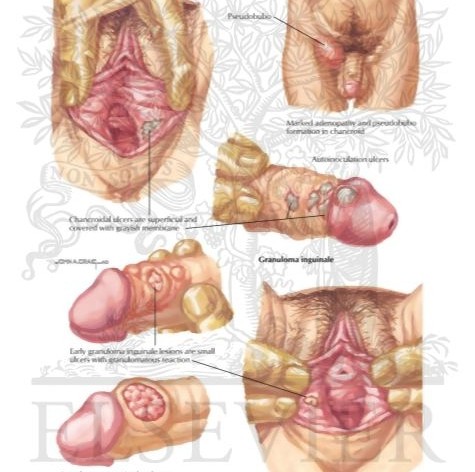Sexually transmitted Diseases are diseases acquired by sexual contact. They can be acquired by having sexual intercourse either vaginally , rectally and in some cases even by mouth .
Organisms that cause STDs can be transmitted through semen , vaginal fluids , blood , other body fluids . Some can also be transmitted non sexually eg mother to child , blood transfusion , shared needles as is the case with HIV .
It’s possible to contract sexually transmitted diseases from people who seem perfectly healthy — people who, in fact, aren’t even aware of being infected.
Causes
Sexually transmitted diseases can be caused by:
- Bacteria (gonorrhea, syphilis, chlamydia)
- Parasites (trichomoniasis)
- Viruses (human papillomavirus, genital herpes, HIV)
Symptoms
STDs can be asymptomatic – even though you are not symptomatic you can still pass on the disease to your partner .
- Sores or bumps on the genitals or in the oral or rectal area
- Genital warts
- Painful or burning urination
- Discharge from the penis
- Vaginal discharge
- Unusual vaginal bleeding
- Sore, swollen lymph nodes, particularly in the groin but sometimes more widespread
- Lower abdominal pain
- Rash over the trunk, hands or feet
Signs and symptoms may appear a few days to years after exposure, depending on the organism. They may resolve in a few weeks, even without treatment, but progression with later complications or recurrence sometimes occurs.
HIV is an infection with the human immunodeficiency virus. HIV interferes with your body’s ability to effectively fight off viruses, bacteria and fungi that cause disease, and it can lead to AIDS, a chronic, life-threatening disease.
When first infected with HIV, you may have no symptoms at all. Some people develop a flu-like illness, usually two to six weeks after being infected.
Early signs and symptoms
Early HIV signs and symptoms may include:
- Fever
- Headache
- Sore throat
- Swollen lymph glands
- Rash
Risk Factors for contracting STDs
- Having unprotected sex / not using condom at all , not using condoms consistently and properly
- Having sexual contact with multiple partners.
- Having a history of STIs – If untreated, STDs can increase your risk of acquiring another STD such as HIV. This happens because an STD can stimulate an immune response in the genital area or cause sores, either of which might make HIV transmission more likely .Also, it’s possible to be reinfected by the same infected partner if he or she isn’t also treated.
- Abusing alcohol or using recreational drugs.
- Injecting drugs
- Being an adolescent female.
- Transmission from mother to infant during pregnancy or delivery – eg HIV , gonorrhea , syphilis
Complications of STDs include :
- Sores or bumps anywhere on the body
- Recurrent genital sores
- Generalized skin rash
- Pain during intercourse
- Scrotal pain, redness and swelling
- Pelvic pain
- Groin abscess
- Eye inflammation
- Arthritis
- Pelvic inflammatory disease
- Infertility
- Cervical cancer
- Other cancers, including HIV-associated lymphoma and HPV-associated rectal and anal cancers
- Opportunistic infections occurring in advanced HIV
- Maternal-fetal transmission, which causes severe birth defects
Treatment of STDs
Treatment of STDS depends on the organism that you have been infected with . It can be as follows :
- Antibiotics
- Anti virals
- HAART
- Partner notification and preventive treatment – If you have contracted an STD your current partners and any other partners you’ve had over the last three months to one year need to be informed so that they can get tested and treated if infected. And since you can contract some STIs more than once, partner notification reduces your risk of getting reinfected.
Prevention
Prevention plays are very important role in the management of STDs . It is the responsibility of everyone who is sexually active to make sure they do not get infected with HIV and other STDs and also to make sure they do not infect others . Both men and women must play a part to curb the spread of HIV and STDs .
Here are is how one can reduce the chances of being infected with ;
- Abstain: Remember abstinence is not just for people who have never had sexual intercourse, even someone who have had sex before can choose to abstain .
- Avoid multiple concurrent relationships and stick with one partner
- Wait and verify : Avoid vaginal and anal intercourse with new partners until you have both been tested for STDs
- Use condoms and dental dams consistently and correctly.
- Don’t drink alcohol excessively or use drugs
- Avoid anonymous, casual sex.
- Communicate with your partner
- Teach your child about sexual health but make sure you use the language that they understand .
- Consider male circumcision – prevents against HIV infection( -60 % ) , also prevents HPV infection .
- Vaccinations against HPV prevents cervical cancer and genital warts . HPV vaccination is now available in Botswana .
Lastly remember that just because someone has no symptoms does not mean they do not have STDs .
By;
Dr Boitumelo Pule-Kitchin














